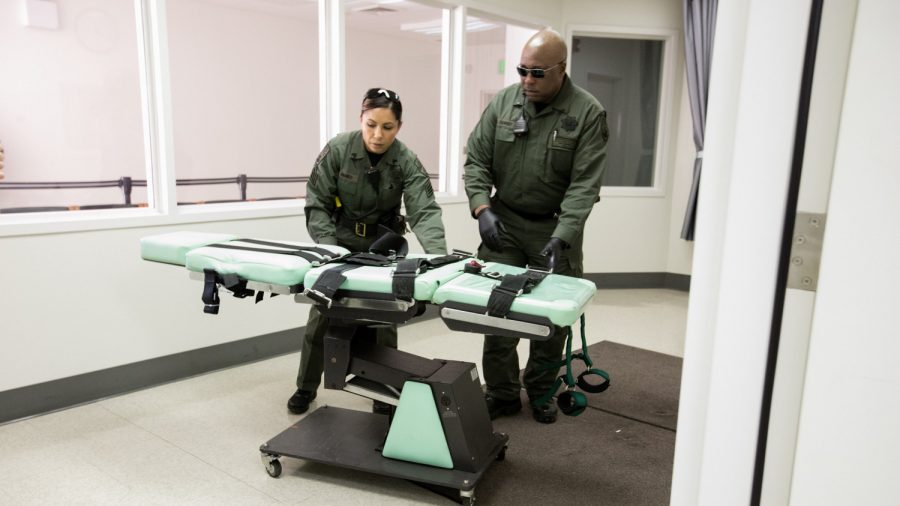MONTGOMERY—An Alabama inmate’s attorney has asked the governor to halt his Thursday, May 16, lethal injection while a Kentucky court weighs the appropriateness of the death penalty for people who were under 21 at the time of their crimes.
Michael Brandon Samra was 19 when he participated in the 1997 slayings in Shelby County of four people, including two children.
Samra was convicted of helping friend Mark Duke kill Duke’s father, the father’s girlfriend Dedra Mims Hunt, and her two daughters, 6-year-old Chelisa Hunt and 7-year-old Chelsea Hunt. Prosecutors said the teens plotted the slayings after Duke became angry when his father wouldn’t let him use his truck.
Duke’s death sentence was overturned because he was 16 at the time of the crime.
Samra’s attorney, Steven R. Sears, sent a letter to Alabama Gov. Kay Ivey asking for a temporary reprieve. The U.S. Supreme Court prohibits the death penalty for defendants under 18, and he argued there is growing concern about the appropriateness of the death penalty those under 21 because of brain development and issues of maturity.

A Kentucky judge in 2017 ruled the death penalty is unconstitutional for defendants younger than 21. Sears asked the governor for a reprieve until the Kentucky Supreme Court decides the appeal.
According to a state summary of the case included in court filings, Mark Duke killed his father, Hunt and the 6-year-old girl and that Samra slit the throat of 7-year-old Chelsea at Duke’s direction while the girl pleaded for her life.
The letter to Gov. Ivey also argued that Duke, who had his death sentence overturned because of age, was the more culpable defendant. He also notes Samra confessed to the crimes.
“His culpability paled in comparison to that of Mark Duke, who plotted, planned and killed three of the victims, including his own father, for revenge” the letter states.
Attorneys for Samra have also asked the U.S. Supreme Court for a stay. The Alabama attorney general’s office is opposing the request.
The U.S. Supreme Court has a “bright line” of age 18 for eligibility for the death penalty and state and federal appellate court have consistently refused to extend it beyond that age, attorneys for the state wrote in court filing with the Supreme Court.

State attorneys said the teens entered the home that night with a plan to kill everyone in the house and argued there is no consensus against executing inmates younger than 21 at the time of their crimes.
“Of the thirty states that retain the death penalty, the number that have passed statutes specifically barring the execution of persons who committed murder between the ages of eighteen and twenty-one stands at zero,” attorneys for the state said.
The lethal injection is scheduled for Thursday night in Atmore.
Death Penalty Ban for Severely Mentally Ill
The nation’s busiest death-penalty state would stop executing inmates who are severely mentally ill under legislation the Republican-controlled Texas House approved on Thursday, May 9, signaling a willingness to soften the state’s tough stance on capital punishment.
The measure may not get much farther, though. It needs to pass the Senate, which is Texas’ more conservative chamber, with less than three weeks left in what has been a politically mild session compared to recent years.
Passage of Democratic state Rep. Toni Rose’s bill was nonetheless a milestone just two years after her last attempt failed to reach the House floor. It would take the death penalty off the table in Texas for inmates who had a severe mental illness, including schizophrenia or a bipolar disorder, at the time of the crime.
The U.S. Supreme Court has ruled mentally disabled people are ineligible for execution, but that prohibition does not include those who are mentally ill.

Rose said Texas would save money by no longer litigating lengthy death penalty appeals of condemned inmates whose executions would be challenged over their mental health. She said they would not escape punishment under her bill because they would instead be sentenced to life in prison without the possibility of parole.
She addressed her Republican colleagues before calling for a vote.
“This body is filled with people who are pro-life,” Rose said. “If you’re pro-life, be pro-life from the womb to the tomb.”
No one spoke against the bill, which passed 77-66 in the House. It was not the first death penalty bill to pass there this year.
Another measure approved in the Texas House would establish pretrial procedures in Texas to evaluate whether a suspect had an intellectual disability, and therefore, was ineligible for the death penalty. But the Senate also hasn’t taken up that measure.


